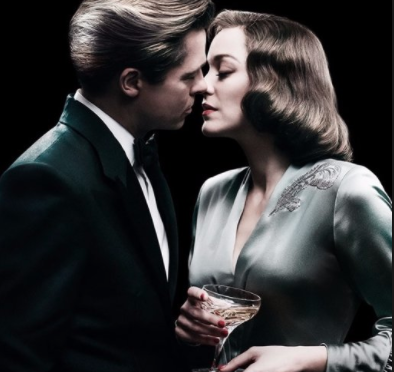“French” Morocco, 1942. A man drops down in the middle of the desert by parachute, walks a while and gets into a car where he’s told, “Your wife will be wearing a purple dress.” So begins Max Vatan’s (Brad Pitt) buildup to meeting the charismatic Marianne Beauséjour (Marion Cotillard), his fellow spy in crime against the Nazis, in the simply titled Allied.
Because it wouldn’t be a Robert Zemeckis film without a very deliberate formula for emotionalism, Allied is extremely strategic with how it unfolds. From the moment Max, a French Canadian in the Royal Air Force–which prompts Marianne to lovingly and derogatorily write his accent off as “Québécois”–locks eyes with his female cohort, it’s all very evident where this is going.
As Ace Rothstein in Casino once said, “The sad thing about betrayal… it never comes from an enemy.” And though Marianne is initially quite adept at acting nonchalant about her profession as an undercover assassin, boasting to Max, “I always play the emotions real,” it’s apparent that there’s more to her agenda than mere fulfillment of lust. The fact that the first act of the narrative takes place in Casablanca is undeniably a nod to the classic film of the same name, likely a deliberate choice on screenwriter Stephen Knight’s (better known for his grittier scripts Dirty Pretty Things and Eastern Promises) part. There are certainly often parallels to the grand Hollywood movies of the WWII era, both Casablanca and For Whom the Bell Tolls coming to mind. But more than anything, Allied is the lovechild of Mr. and Mrs. Smith (obviously not the Hitchcock version) and Inglourious Basterds. And it’s not just because the latter takes place during the height of Nazi occupation in France or because the former broke up a real life marriage just as Allied was purported to. No, it’s more than just those things. The subterfuge, the stifled, forbidden romance predicated on lies, for one, is Mr. and Mrs. Smith to a tee.
With identities and emotions concealed, Marianne points out to Max that, “It’s not fucking that gets you into trouble in these situations. It’s feeling.” And who has time for feelings when the sky is quite literally falling? As Max and Marianne both allow their defenses to wear down, they each become more willing to take romantic risks as the night of their mission–to kill a Nazi ambassador–approaches. In one particularly player move, Marianne remarks to Max, “We could die tomorrow and no one would know,” as a sandstorm bombards their car in the middle of the desert, which they had only gone to at Max’s suggestion to “watch the sun rise.” And what puts someone in the mood like swirling sand that could spell imminent death? Hence, one of the most exciting scenes of the movie, in which you can sort of see two of the highest paid actors in the buff–and if that’s not what Hollywood movies are about, then I don’t know what is.
Like Inglourious Basterds, the female protagonist, Emmanuelle Mimieux (Mélanie Laurent) is, well, sort of a bastard–granted out of necessity, much in the same way Marianne must betray Max for her own self-preservation. But maybe it’s wrong to compare Allied to other films, as one could also throw Vertigo (the whole two films in one element) and Nocturnal Animals (the intense backstabbing also at play) into the mix. Maybe it’s precisely because Zemeckis is such a formidable auteur that he knows how to draw on manifold elements of pastiche to invoke all of these comparisons. Or maybe the WWII romance has simply been “done to death,” and can’t help but seem somewhat derivative. The bottom line is, this man is capable of going from the camp perfection of Death Becomes Her to the box office pleaser of Allied, which is a level of versatility possessed by few living directors.
Allied, however, is most definitely his first movie to deal with the subject of deception on this scale (Marty McFly not telling the past version of his mother who he is doesn’t count). The tag line, evolved from the bold reminder–“Remember the enemy is always listening.”–in Max’s London office is brings to light a lamentable reality: the enemy often turns out to be one’s significant other. And, in this regard, love is frequently the most dangerous secret weapon.





















